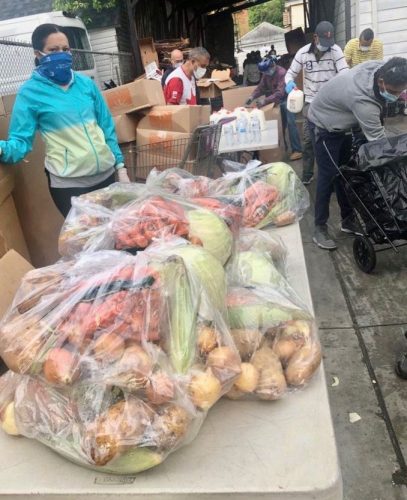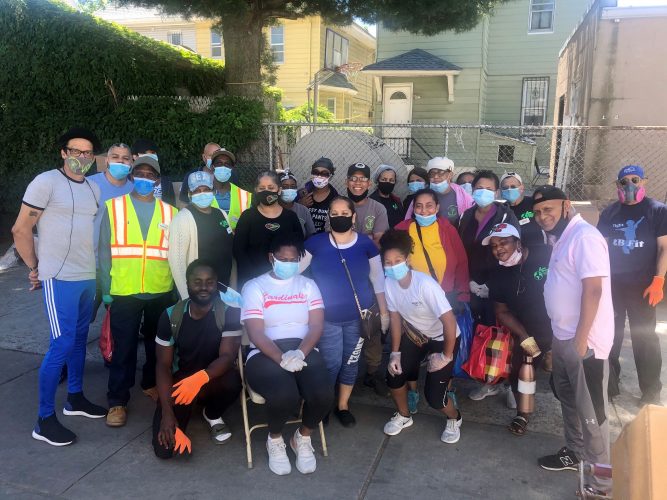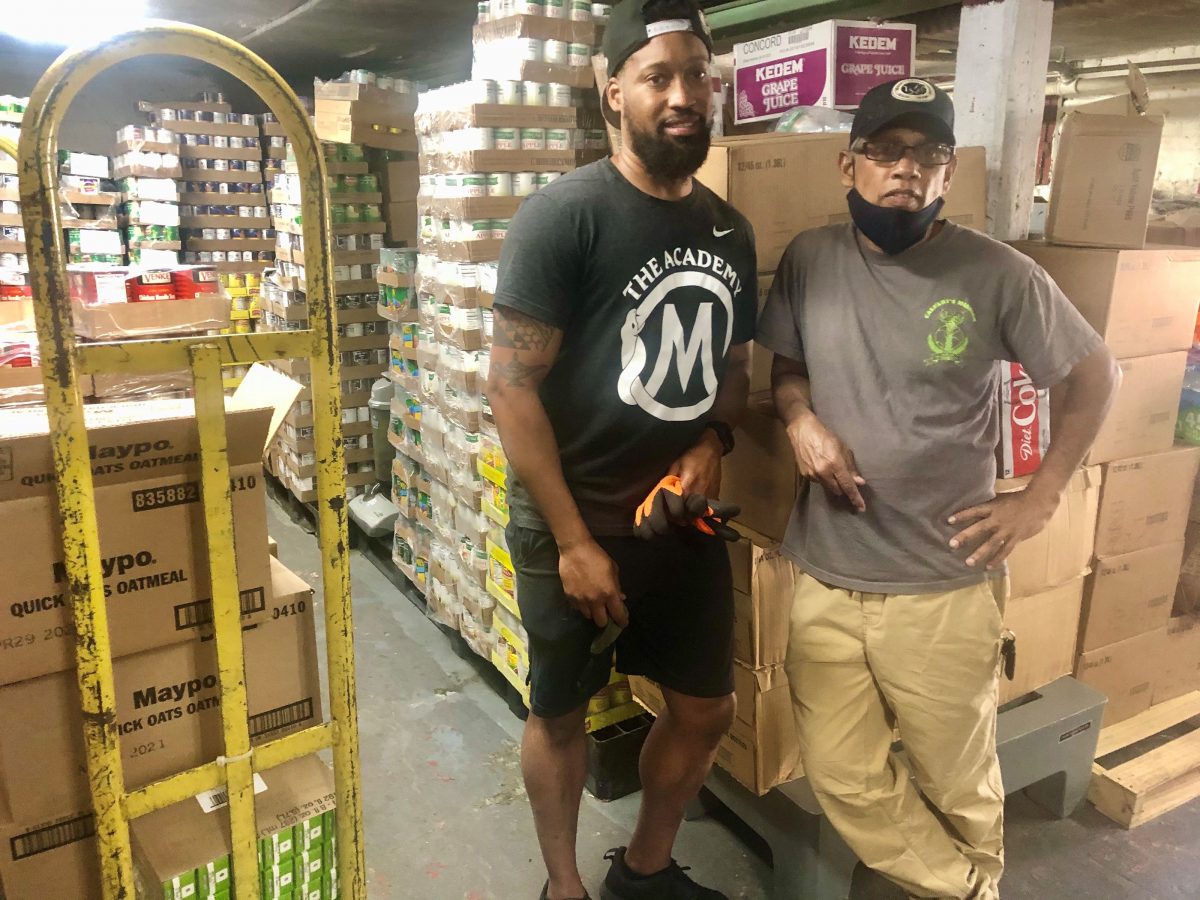Every Saturday over 1,600 Guyanese and other immigrants leave the Calvary’s Mission Food Pantry (CMFP) in Richmond Hill, Queens in New York feeling relieved that their week’s groceries have been taken care of.
Before the novel coronavirus disease (COVID-19) pandemic started, the pantry served 400 underprivileged immigrants weekly.
With many people being laid off, resulting in the whopping increase of recipients, 50 volunteers have been working extra hours to ensure the food is packed and ready for pick up.

Tony Singh, a New York City businessman along with other members of his “prayer group,” established the pantry some 20 years ago.
Roger Gary, a board member, told Stabroek News (SN) that they have been going on Fridays to put together the packages, which include fresh fruits and vegetables, split peas, channa, rice, eggs and milk. They also give out snack packs and breakfast boxes, some containing a bagel, butter, cheese, apple and orange juice.
On Saturdays they are at the pantry from 5:30 am to ensure the process goes smoothly. Before the “clients” leave with their full trollies, they are issued tickets for the following week, with time slots of every half hour, from 7 am to 11:30 am.
The time slot system was implemented to manage the large crowd and to avoid too much contact.
Everyone is also required to wear a face mask and maintain the six-feet distance.
The items are packed and laid out on tables for an easy pick up and go system.
He said the items are “sufficient for everyone…. Whatever we give them they make it work until they come back.”

He finds it “satisfying” to be part of an exercise that brings relief to people in their times of need. He recalled that he was very happy when he was introduced to Singh and joined the team in 2001.
Singh’s son-in-law, Kevin Sookdeo, said 80 percent of the clients are undocumented and do not qualify for assistance from the government, even though their children may be US-born.
“There is a great fear in this community that ICE (Immigration and Customs Enforcement) is going to be involved, especially under this presidency,”
Singh who became a member of the CMFP in 2008, said.
“We don’t ask for any identification or additional information other than family size…So we don’t want to marginalize anyone who feel that their status in the United States might be an issue.”
Some families have five to seven members, so the pantry is reaching out to about 10,000 individuals weekly and as Sookdeo puts it: “Hunger isn’t just a one-day issue.”
The CMFP distributed 3.7 million pounds of food last year and this year it is reaching seven million pounds.
Sookdeo noted that they normally keep 25,000 pounds of food in the reserves but because the lines continue to get longer they only manage to keep 15,000 pounds.
He pointed out that in the beginning of the pandemic they were “wondering how we would survive.”
After noticing their great effort, some kindhearted individuals pitched in with monetary assistance.
They were happy too that New York state responded and has “partnered with different farms to get us fresh produce, poultry and eggs” to distribute. This is also helping the farmers to cope during the lockdown.
He said a lot of funds that they have in the reserve are also going towards meeting the demand.
While this newspaper was there last Saturday, the CMFP purchased 2000 chickens for the next week’s distribution at a cost of US$10,000.
Working poor
Singh, a New York City businessman, told SN: “I always say the programme is for the working poor because people are working and it is still difficult for them to make ends meet.”
Growing up in a poor family with 11 siblings in Georgetown, Guyana, he knows what it feels like to have a hard life and to be hungry.
“Coming to the US, the Lord has blessed me to establish myself… and I see it fit to invest my time, labour and my finances in this organisation to have it running. Singh, who is enthusiastic about his work at the pantry, feels pleased that “everyone goes home with something and there is still enough for the volunteers.”
He had even made a post on his Facebook page, after the pandemic started, for people to contact him if they needed food and has received many calls.
Despite his busy schedule of working 10 hours, he still manages to “put in two hours of work” at the pantry and to also deliver food to eight seniors on Friday evenings.
He does it selflessly, even though it is worrying to his family because of underlying medical conditions.
Even though he was aware of the risks involved, he did not stop because he was “doing it for a higher calling and not for material gain. I try my best to ensure that I am making a difference in society. It gives me satisfaction to know that if someone is hungry I can reach out to them.”
He would also tell his children that if they never experienced hunger or some disaster they would never know how the next person feels.
“So when you see someone on the street begging for a meal, don’t turn your back on them, help them, buy food for them…, he advised.
Singh, his daughter, Asha, 25 and other team members, visit Guyana yearly to conduct charitable work.
Asha, after learning of the abuse some of the girls suffered before living at an orphanage, became passionate about helping them to cope.
She also raises funds to provide them with basic needs, such as hygiene packages, clothing and food.
The CMFP has also provided assistance to other countries like Trinidad, Haiti and Puerto Rico.
Singh said the pantry got started after he and his team recognized that many immigrants are not immediately able to stand on their own, when they arrive in New York (NY).
Their first step was going to Costco, a wholesale complex, and purchasing food items and distributing them. Before they knew it, the demand started to grow.
He is grateful to the pastor of the Calvary’s Assembly of God Church for allowing them to use the compound and for giving his full support to the CMFP.
Meanwhile, Sookdeo who holds a jurist doctorate degree with his area of concentration being International Human Rights, was happy when he found the CMFP and learnt that no paid employees existed there.
“There are many inequities in this world but at least the thing we can provide is the “labour of love,” he told SN.





